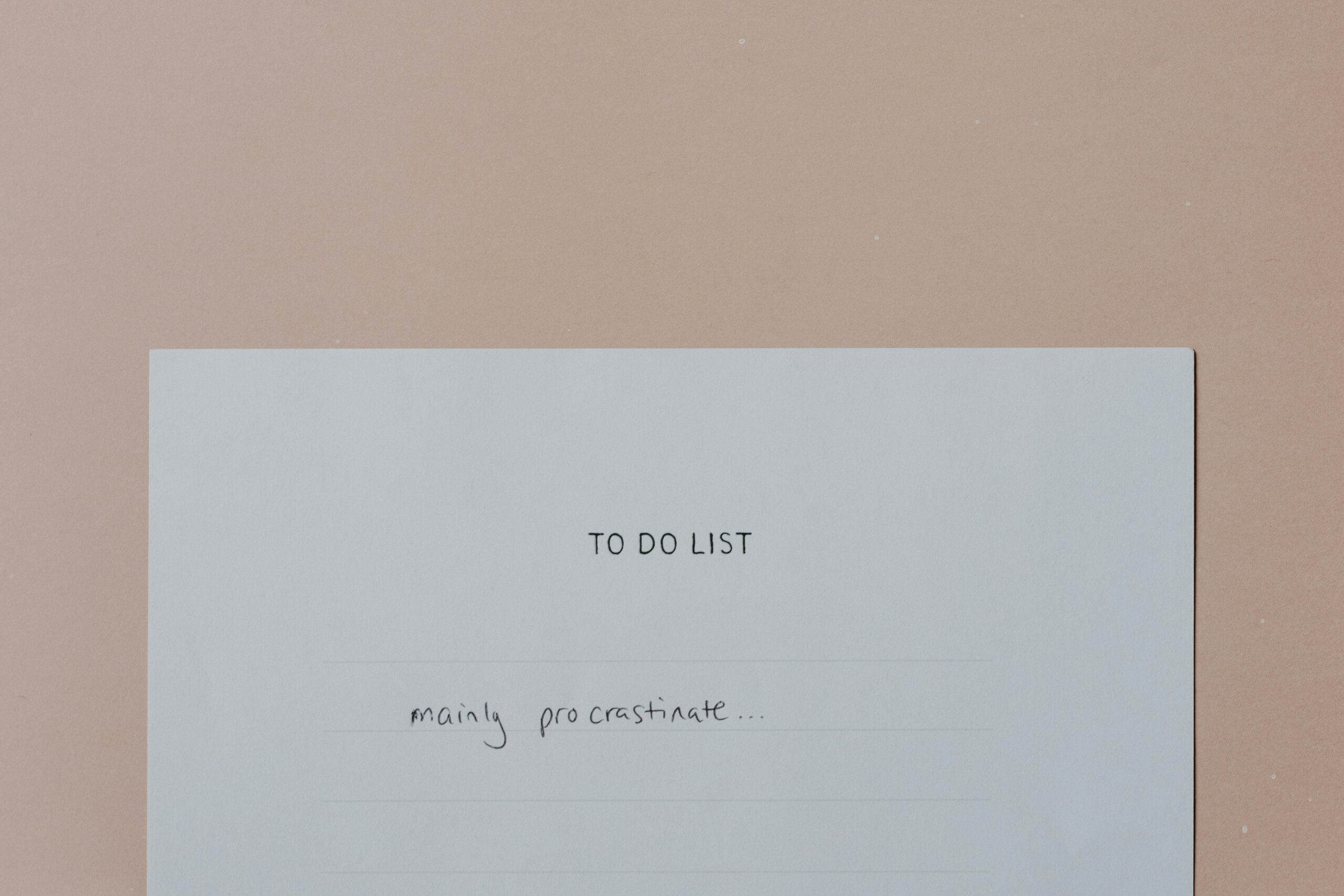Procrastination is one of the most common topics that comes up with my clients and it is the most relatable. I find it ironic that I procrastinated on a blog about procrastination. Odds are we have all been there at some time. A project you must do but you find time-consuming or hard to get started so instead you find anything else to do, let’s talk briefly about why procrastination can occur and then I will give you some strategies to help decrease your procrastination.
 Through experience, I’m going to tell you the common reasons I have found for procrastination. The first of them being time blindness. This can be a symptom of ADHD, or it can be an issue that you struggle with. It’s the idea that when you have a task, you either believe that is going to take less time or more time than it truly does. This can be hard when planning out activities because you are truly unaware of how long they will take you. So how does this affect procrastination? Well, if you don’t truly know how long something is going to be you might not be able to plan effectively for when to get it done which can cause you to put it off until you can’t any longer.
Through experience, I’m going to tell you the common reasons I have found for procrastination. The first of them being time blindness. This can be a symptom of ADHD, or it can be an issue that you struggle with. It’s the idea that when you have a task, you either believe that is going to take less time or more time than it truly does. This can be hard when planning out activities because you are truly unaware of how long they will take you. So how does this affect procrastination? Well, if you don’t truly know how long something is going to be you might not be able to plan effectively for when to get it done which can cause you to put it off until you can’t any longer.
The second thing and the one that I struggle with the most is becoming too overwhelmed by the task. A project can feel very daunting to, and you struggle with where to begin. Picture yourself standing at the base of Mount Everest and looking at the top contemplating how to reach the summit. This can be extremely overwhelming from at the base. It’s a very long way up. It’s the same way for a project or task you’re at base of the mountains, staring at the top, and you’re not sure where to begin to get there. Anxiety of not knowing where to begin or feeling like there’s too much to even start can cause you to freeze and make productivity drop to zero. It’s only when the deadline is looming close that your brain unpauses and allows you to get started down the path because the anxiety of being late outweighs the anxiety of the project. Procrastination and why it occurs is different for every person, focusing on why it occurs won’t change it, but if it’s a behavior you want to change how do you change it.
Building mastery
A lot of times we find ourselves procrastinating on the same project/task repeatedly. “I can just do the laundry tomorrow. It doesn’t have to get done now.” Procrastination becomes an everyday or every week thing in your life. One way to help prevent this is to follow the steps of building mastery from DBT. Take your task, let’s use the example of laundry and create a plan to build your mastery. You need to start by creating a realistic and challenging goal that does not feel impossible. Start small with the idea that you can always increase if it is not challenging enough. I encourage you to set not only a day goal, but also a duration goal for that day. For example, “I’m going to do laundry for 30 minutes twice a week.” Once you have that goal, attempt to implement it. If you find that that is too hard or impossible, lower your goal. When you find a goal that is attainable yet challenging, do the task at that frequency until it feels easy to complete. Once this happens you are going to increase your goal. The way to do this is by either increasing the time, the number of days, or both, whichever fits the statement, challenging but not impossible. From there you repeat this process until you find you have created a comfortable rate at which you are no longer procrastinating the task.
Breaking it down goals into pieces
Building mastery is a wonderful tool if you’re procrastinating on a task that you do frequently, but what about those tasks that aren’t done on a weekly basis. For those experiences, the best way is to break down the task/goals into smaller task/goals, scheduling a set day to get it accomplished and then putting a time limit on yourself to complete the task. For example, let’s take the task of writing a paper. There are multiple steps that must occur to get the paper done. Monday, I will read and find research articles. On Tuesday, I’m going to write the opening paragraph. On Wednesday, I’m going to write the body or argument of the paper. On Thursday, I will complete the conclusion. Finally on Friday, I’m going to do the resource page. When setting the time limit the trick is to not give yourself more than an hour to work on any set task. If it takes more than an hour, you either need to add an extra day/ more time or further break down the goal. Finally, schedule a specific time for each task where you can get it done. The final example would look like this: “On Tuesday I will work on my opening paragraph for 30 minutes at 2 PM. Remember, if the task still seems daunting, break it down further until you have a manageable list for yourself.
Positive reinforcement
If you ever had a star chart growing up where you would do a chore get a sticker and then after 10 stickers you got a prize, then you have received a form of positive reinforcement. Children have this use for them all the time, but we often forget that as adults it works just as well. You can use positive reinforcement in conjunction with either of the other two tasks, or you can use it on its own. All you’re going to need to do is set a realistic reward for completing the task that you progress on. This can mean that you reward yourself at every step of the breaking it down or when you find it easy to complete the goal from building mastery. Just make sure that you give yourself a reward that is comparable to the task that is being completed and that you enjoy the reward.
Involving your environment
This one will have a few things that you can do, but the idea is that by involving other people they can help you reduce procrastination. One way to do this is to have somebody who is willing to check in with you frequently during the task. They will call and make sure that you are completing the task, they can also be involved in the positive reinforcement side by joining you during the reward or their praise can be a positive reinforcement. The second thing that can be helpful is to find someone who will function as a body double for you while you are getting the task done. Body doubling is where the other person stays in the same room that you do, while doing whatever task that they want. They sit there with you until you get the task done that you need to complete. The biggest caution about involving your environment is that you want to choose someone who will help you without judging you or invalidating you on your procrastination.
Remember that procrastination is a learned behavior that you have been doing throughout your life so it will take time to reverse the habit and create a new way of behaving yourself and look at it from a mental side while you’re doing it. It may not be fully gone the first time, but with continued practice, you’ll find your procrastinate lesson less.
About the Author
Samantha Ruwe (she/her), M.A., LPC is a Licensed Professional Counselor who specializes in dialectical behavior therapy. She works with teens and adults in a warm, compassionate, and non-judgmental manner to help clients build a life worth living. Samantha knows that therapy can be daunting to begin and is supportive of clients at all parts of their counseling journey. Click here to learn more about Samantha’s experience and therapeutic approach.


